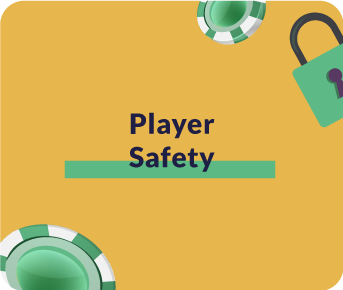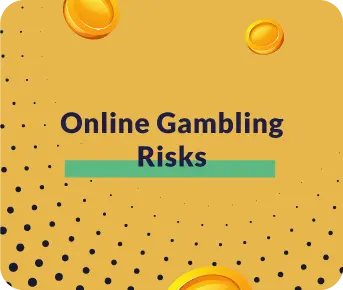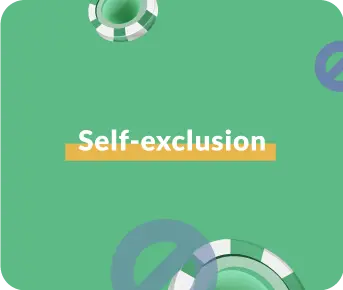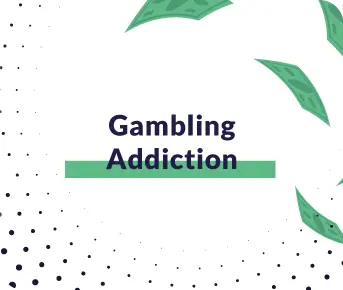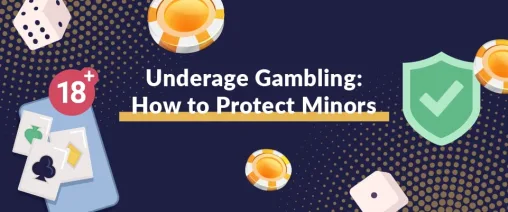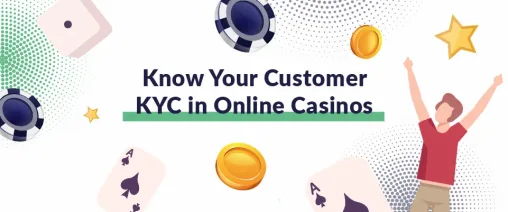Responsible Gambling
Welcome to our guide, where you can learn everything you need about responsible online gambling. This guide will teach you how to select between trusted and licensed online casinos and provide you with ideas and tools to assist you in making the most of your casino experience.
This tutorial will be focused on you, your health, and how to compare each online casino to pick the one that best matches your needs.
Whether you have a gambling issue or are simply seeking additional information, this guide aims to give you the information you need to play responsibly.
Let’s dive in.
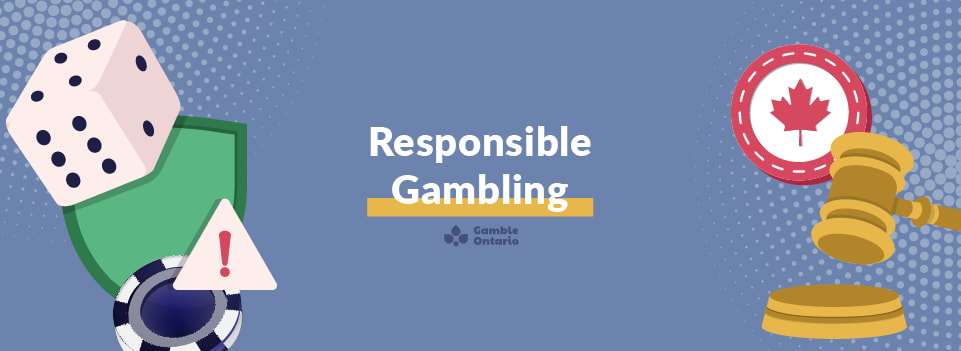
What Is Responsible Gambling?
Responsible gambling is the practice in which individuals engage in online gambling as a form of entertainment, setting a budget, wagering only money they can afford to lose, and knowing when to stop playing.
What is Problem Gambling?
Problem gambling can be described as any gambling behaviour that disrupts your life or the lives of those around you. Indications of problem gambling include:
- Spending beyond one’s means.
- Borrowing money to fund gambling.
- Obsessing over gambling.
- The need to bet more for the same excitement.
- The inability to pause or quit gambling.
- Feeling restless or irritable when trying to cut down on gambling.
- Trying to recoup losses (“chasing” losses).
- Concealing gambling habits from loved ones.
- Letting gambling harm personal relationships or work.
What We Do at GambleOntario to Promote Responsible Gambling Practices
At GambleOntario, we’re all about fun and safe gaming. Our top priority? Making sure you play responsibly. Here’s our pledge to help you enjoy the games while staying in control. Keep reading to see how we’re looking out for you.
- We only partner with licensed casinos and sportsbooks and spotlight the best gaming sites that prioritize responsible gambling.
- We regularly review our listings to ensure they promote safe and fun gaming experiences.
- We present the important details transparently, so you’re always well-informed.
- Find handy tools and verified resources on our site to help you set limits and play responsibly.
- We’re always here to guide and discuss any concerns about your gaming habits.
- We listen to our user community and prioritize their feedback in our recommendations.
- Our team is committed to staying updated on responsible gaming practices to serve you better.
Together, let’s enjoy the game responsibly.
What Are The Signs of a Gambling Problem?
Are you or a friend showing these signs? It might be time to get help. Here is a list of the most common symptoms of problem gambling.
- Chasing Losses: Trying to win back the money you lost.
- Hiding It: Being dishonest about when or how much you gamble.
- Money Issues: Always borrowing money for gambling or having mysterious debts.
- Mood Changes: Feeling down, anxious, or guilty after playing.
- Pulling Away: Spending less time with loved ones because of gambling.
- Always Thinking About It: Can’t stop thinking about the next bet or game.
- No Limits: Gambling more and more money or not knowing when to stop.
- Denying the Problem: Not accepting that gambling might be causing harm.
Notice these signs? It’s okay to ask for help. There are many places ready to support you.
You can take the free Gambling Self-Assessment Quiz by the Responsible Gambling Council (RGC)
It consists of nine questions and won’t take you longer than 3 minutes to complete.
The dangers of gambling addiction can be hard to spot, as shown in a 15-second video by RGC that demonstrates the fast-paced nature of casino gambling and sports betting.
Setting Your Gaming Limits: A Quick Guide
Upon registration, players are given the ability to easily set both financial and time-based limits on their gambling accounts. These measures are in place to promote responsible gaming.
Initially, during the registration phase, players are presented with options to set limits on losses and deposits.
Thereafter, they can choose from various limits like:
- deposit limits, which restrict the amount they can deposit over a selected time frame, or
- loss limits, where the potential losses are capped.
These limits can span over durations such as 24 hours, 7 days, or a month. If a player sets multiple limits simultaneously, the most restrictive one is enforced.
The system is designed to ensure that any limit-related functions are straightforward to locate and adjust at any point after registration.
However, if a player wishes to ease or remove a previously set limit, there’s a mandatory 24-hour cooling-off period before any changes take effect. This is to ensure players have ample time to reconsider their decision. All these gaming limits are enforced systemically to uphold players’ chosen boundaries.
Game Addiction Statistics
Even though online casinos only recently became legal and authorized to operate in Canada, the country has had land-based casinos, lotteries and scratchies for a while now. Gambling is a very addictive form of entertainment that can spiral out of control when left unchecked, or gamblers have no recourse if they develop the problem.
Here are some of the 2021 statistics about Canada concerning gambling addiction:
- Around the world, 350 million people have gambling problems. Around 220,000 of these people live in Canada, with 1,000,000 of them having problematic gambling behaviours that are likely to worsen shortly.
- The most extreme gambling addicts in Canada frequently lose more than $500,000 annually.
- Between 2002 and 2018, the percentage of problem gamblers in Canada declined.
- Approximately 75% of Canadians engage in some type of gambling.
- Over 2% of Canadians older than 15 years have problematic gambling habits.
- Ontario generated the highest gambling revenues (money players lost) of any province ($3.8 billion), followed by Quebec ($2.73 billion) and Columbia ($1.2 billion).
How to Set Limitations and Exclusions
If you believe your gambling behaviour has deteriorated, you can learn what to do. However, it’s important to remember that you may always take action if you discover you’ve lost control of your gambling. So first, we’ll look at the gaming authorities overseeing the online gambling industry.
Gambling Authorities
Gambling Authorities, such as the AGCO, are governmental departments that fall under the jurisdiction of a country’s government and other bodies of law.
Their goal is to ensure that gaming and internet casinos are regulated and that the gambling industry operates fairly.
They verify an online casino’s level of quality, security, and trustworthiness, enabling the casino to operate lawfully on the internet. They also ensure that gamers and their information are secured, enabling them to play in a safe environment.
Cool-off Period
Many online casinos include a cooling-off period during which you can recalibrate your strategy. You may lose confidence in your gambling behaviour and want to stop playing.
A “cooling-off period,” which can be found in your online casino account settings, is a method of preventing yourself from wagering for a specified amount of time.
Once engaged, you cannot place any bets for the next 24 hours. This is a great approach to getting back on your feet and thinking about your behaviour patterns. In addition, many online casinos include a section available in the account settings that allows you to gamble more responsibly by cutting yourself off gambling for as long as you need to.
If you feel like you’ve lost control of how much you input or spend at an online casino, setting deposit and loss limits might be a great way to regain that control.
Loss limits can be adjusted to whatever amount you think is appropriate. However, you will be instantly barred from placing more bets once your loss limit has been achieved. The casino will then have you wait a set amount of time before allowing you to play again.
What Self-Limits Are Available For Players in Ontario?
It is important for regulatory bodies like AGCO to establish rules and guidelines to ensure that gambling is conducted in a responsible and ethical manner. By setting standards for licensed operators, AGCO is helping to promote a safe and fair gambling environment for all participants.
So here is a complete list of all the self-limits players can set on their accounts:
Short-Term Break:
- Users can opt for a short break from their gaming activity.
- Break options include 1 day, 1 week, 1 month, 2 months, or 3 months.
- Once initiated, users cannot place bets during this break.
Self-Exclusion Program:
- Operators must offer a well-promoted and easily accessible self-exclusion program.
- The registration should be efficient and supportive, with clear resources on seeking help.
- The self-exclusion program’s terms should outline player obligations, consequences, and a safe return process.
- Exclusion terms should be 6 months, 1 year, or 5 years.
- Upon self-exclusion, users will be logged out and can’t access their accounts during the exclusion period.
- Marketing materials or promotions shouldn’t be sent to self-excluded users.
- If a user self-excludes before an event they’ve wagered on starts, their wager must be refunded.
- No refund is needed if they self-exclude after the event has started.
- Operators should maintain a register of self-excluded users with relevant details.
- If a self-excluded person breaches their agreement, they should be identified and removed.
- There must be a system to return unused funds to a self-excluded user if they request it.
Identifying Gambling Addiction: Signs, Causes, and Risk Factors
You may already be too deep if you don’t detect the early warning signs in time. The first step toward recovery from gambling addiction is to admit that you have a problem in the first place.
After all, whether we’re talking about yourself or someone in your immediate network of contacts, no one will assist you if you don’t want to be assisted. The psychological components of gambling addiction are something you should know about.
Knowing how problem gambling affects a person might help you determine whether you have any of these indicators in your behaviour.
If you already feel you have a gambling concern, it’s critical, to be honest with yourself while you read this section.
If you believe a family member or friend is struggling with problem gambling, here is a good place to start learning more about this issue.
Psychological Symptoms
If you’re unsure about having a gambling issue, there are a few mental indicators to watch out for. Keep an eye out for the following mental signs:
- Depression
- Suicidal ideation
- Restlessness
- Anxiety
- Insomnia
- Loss of focus
- Mood swings
- Feelings of stress
- A struggling immune system
- Excessive sweating
- Persistent headaches
- Stomach and muscle pains
- Higher than normal heart rate/palpitations
All these symptoms are your body trying to tell you that you are placing it under a lot of stress. So if you notice these symptoms, it is a good sign that you need to take a step back and take care of yourself.
Sometimes, it could be that you have a problem with gambling but don’t know it. If your body signals you, try getting help even if you don’t think you need it.
Gambling Addiction Types
Because there are so many diverse online casino games, problem gambling and gambling addiction may take many different forms. However, the common denominator is virtually the same, and the symptoms discussed in this section apply regardless of the sort of game you focus on.
Games of chance are the first category of games with the highest chances of inducing an addiction.
To win, these games do not require any skills or expertise; instead, they depend simply on chance or the RNG (Random Number Generator) to determine wins. Slot machines, scratch cards, and all types of roulette are included in this category.
Another category to watch out for is skill-based games. These games are defined by strategy implementation and are subject to a period of adjustment. However, players who practice skill-based games can improve their skills by playing them frequently, boosting their wins. Poker, sports betting, and chess are examples of skill-based casino games.
Young individuals aged 19 to 35 are considerably more likely to play skill-based games. Readily available games can also be classed as a “type” game. In this category, you’ll find pub slot machines, claw machines, or the funfair’s coin machine. Because a problem gambler cannot avoid them, readily available games make it more difficult to quit gambling altogether.
Research on gambling addiction shows a link between game availability and the likelihood of addiction.
Another feature that may make a game appealing to problem gamblers is the speed at which it is played. As a kind of rapid satisfaction, the faster a game runs, the more excitement and thrill it will provide the participants. For example, poker and sports betting are fast-paced games, whereas lottery games and bingo games are examples of slow-paced games.
Personal gain is one of the factors that influence gambling addiction. Players wager to win a large sum of money in a couple of seconds.
The desire for large sums of (usually) unobtainable money is a major factor in why people develop gambling addictions.
Genetics (Being Related to People With Addictions)
Numerous studies have found that genetics plays a vital role in developing any addiction. For example, a family member who is addicted puts a person at a higher risk of addiction, but genetic potential alone does not mean a person will form an addiction.
Mental Disorders
Some people gamble to escape reality and find pleasure in playing casino games or games of chance, particularly from the comfort of their own homes. However, gambling should be avoided by those who suffer from anxiety since it may be used as a coping mechanism to deal with their psychological condition, which contradicts the intent of gambling as a recreational form of amusement.
Obsessive-Compulsive Characteristics
When a person has little to no control over their inclinations, gambling addictions can develop, which can be risky.
Gambling becomes problematic when a desire or sudden need to play casino games develops over time rather than as a single event.
As described in the earlier sections, the worst thing a gambler can do is try to recoup lost bets by making larger and more frequent wagers, leading to an obsession with recouping lost bets.
Inability to Control One’s Behavior
Individuals who struggle to control specific behaviours, ideas, or emotions are more likely to develop a gambling addiction. The inability to moderate behaviour in anticipation of earning a reward has been connected to the development of addiction in studies.
This implies that if players can’t manage their emotions after losing a bet, they’re more likely to chase lost bets, leading to compulsive gambling.
Risk Factors Associated with Gambling Addiction
Several risk characteristics can lead to gambling addiction if not addressed or managed. Therefore, the elements listed below must be considered to prevent developing problem gambling. In addition, if you or a loved one exhibits any of the following characteristics, it is advised to abstain from gaming:
- Due to a great early victory, a false sense of gambling may develop.
- Access to gaming platforms is easy.
- Players may not be aware of the genuine winning odds.
- There is no responsibility for victories or losses.
- Going through a major life transition or catastrophes, such as a job shift, divorce, or the death of a loved one, can trigger the problem.
- Boredom or loneliness tendencies.
- A history of being impulsive or taking risks.
- Have financial difficulties.
- A lack of hobbies or interests.
- A history of mental illness, especially sadness and anxiety.
- Experiences of abuse or trauma.
- A family member who has struggled with addiction.
The more of the criteria mentioned above a person has, the more likely they are to develop a gambling addiction.
Getting Help With Gambling Problems
The essential thing is, to be honest with yourself and how you feel about gambling addiction.
Gambling impacts the gambler’s general mood, capacity to think about anything other than gambling, relationships, financial status, and employment, among other aspects, as discussed in the sections above.
Recognize that you need assistance, and bear in mind that various organizations and bodies in Canada are committed to assisting gamblers in overcoming their addiction.
There is no shame in getting addiction treatment, and in this part, we’ll list all the resources available to you when you’re looking for assistance and solutions to conquer your addiction.
Treatments for Gambling Addiction
There are several methods to overcome a gambling addiction, and although some people tackle the problem independently, others find it too overwhelming.
Any addiction may be overwhelming, and knowing that there are people and organizations committed to helping those struggling with problem gambling is a comforting feeling.
Responsible Gambling Tools & Resources in Ontario
Here is a comprehensive list of organizations that provide consultation for gambling addiction. You’ll find all the tools and resources available to Ontario players, along with their contact information.
1. Connex Ontario
This free and confidential service is offered in 170 languages and is available 24/7 in Ontario, Canada.
- Purpose: Provides a comprehensive suite of resources, including information and referral services targeting mental health, addiction, and problem gambling across the province.
- Availability: Accessible 24/7 via phone, email, or online chat.
- Website:Connex Ontario
- Phone: 1-866-531-2600
- Email: Send an email to Connex Ontario
3. Responsible Gambling Council (RGC)
- Purpose: Assists individuals in avoiding gambling problems and taking necessary actions when issues arise.
- Website: Responsible Gambling Council
3. OLG’s PlaySmart
- Purpose: Equips players with information to make informed decisions and ensures the game remains enjoyable.
- Website: PlaySmart.ca
4. Gambling, Gaming and Technology Use
- Centre for Addiction and Mental Health
- Purpose: Offers specialized treatment for problem gambling and shares resources on self-help tools and methods to assist a loved one.
- Website: GGTU | Gambling, Gaming and Technology Use
5. Lower-Risk Gambling Guidelines
- Canadian Centre on Substance Use and Addiction
- Purpose: Provides three key guidelines designed to minimize the risk associated with gambling-related harm.
- Website: Gambling Guidelines
Other Helplines
Problem gamblers can contact the following helplines across Canada for assistance in overcoming gambling impulses and the addiction itself:
- Ontario Problem Gambling Helpline — 1-888-230-3505
- British Columbia Problem Gambling Information and Referral Service — 1-888-795-6111
- Manitoba Gambling Helpline — 1-800-463-1554
- New Brunswick Problem Gamblers Hotline — 1-800-461-1234
- Nova Scotia Toll-Free Gambling Helpline — 1-888-347-8888
- Prince Edward Island Gambling Addiction Treatment Program — 1-888-299-8399
- Québec – Gambling Help and Referral — (514)-527-0140
- Montreal and surrounding area — 1-800-461-0140
- Saskatchewan Problem Gambling Helpline — 1-800-306-6789
Learn More About Responsible Gambling and Player Safety
How Can You Quit Gambling?
There are effective strategies for stopping problem gambling, and taking matters into your own hands will need perseverance and a strong desire to change. However, eliminating the risk factors and substituting healthier alternatives can help you overcome your gambling issue and enhance your quality of life and of others around you.
Urges to Gamble
Divert your attention away from gambling when you feel the need to place a wager or play casino games. First, consider the effects of gambling and how it will affect your mood. Then, distract yourself from gambling by doing anything else right away.
For a better life, train your brain to make the best decisions every time.
Money
You won’t be able to gamble if you don’t have any money. If you believe you’re at risk of relapsing, remove money from the equation by cancelling credit cards, allowing your spouse or a close friend to manage your funds, or, if you want to be extra cautious, requesting direct payments from the bank. Of course, all betting accounts should be cancelled to eliminate any temptation.
Time to Play
Keeping oneself occupied is one of the most critical aspects of breaking a habit since it pulls your attention away from gambling. Therefore, it’s necessary to set apart time for yourself unrelated to gambling, and the impulse will fade over time until you are no longer thinking about wagering.
Most Common Questions About Responsible Gambling
What is considered responsible gambling?
Responsible gambling means playing games of chance in a way that doesn’t negatively impact your finances, well-being, or lifestyle. It involves setting limits, knowing when to stop, and gambling only for entertainment, not as a way to make money.
What is the main cause of gambling addiction?
Gambling addiction doesn’t have a single cause. It arises from a combination of biological, psychological, and social factors, including a desire for instant gratification, emotional distress, and, in some cases, genetic predisposition. If you or someone you know is at risk, it’s essential to seek advice and support from credible and certified professionals.
How do you deal with a gambling addict?
Dealing with a gambling addict requires compassion and understanding. Encourage open communication, suggest professional help, avoid judgment, and learn about the condition to provide proper support.
Who is most at risk of gambling?
Those with a history of impulsive behavior, previous addiction issues, mental health disorders, or a family history of addiction are typically at higher risk.
Where can I get help for gambling addiction?
Help for gambling addiction can be sought from local mental health clinics, helplines, or organizations like ConnexOntario. For a full list of relevant organizations, jump to the list of responsible gambling tools and resources above.
How do I block gambling sites in Ontario?
In Ontario, you can use software like BetBlocker or GamBan to block access to gambling sites. Some internet service providers might also offer parental controls to restrict such sites.
Can I block my debit card from gambling sites?
Yes, you can contact your bank or card provider and request restrictions or blocks on gambling transactions. Some banks also offer app-based controls to self-restrict such activities.
List of References
To gain a comprehensive understanding of gambling behaviors, patterns, and regulations in Ontario, the following references provide invaluable insights. We keep updating this page with the latest sources and tips for responsible gambling practices.
Self-Exclusion and Breaks in Play | Alcohol and Gaming Commission of Ontario
Who gambles and who experiences gambling problems in Canada
Limit Setting Features | Alcohol and Gaming Commission of Ontario
